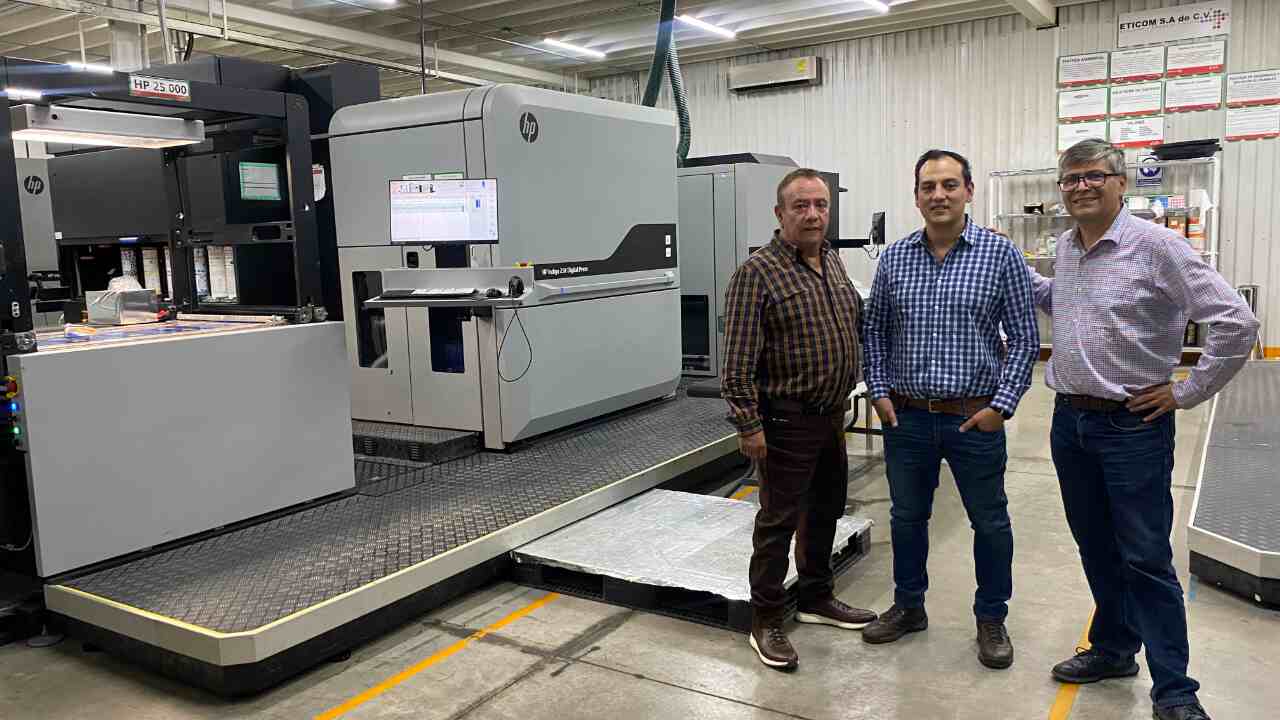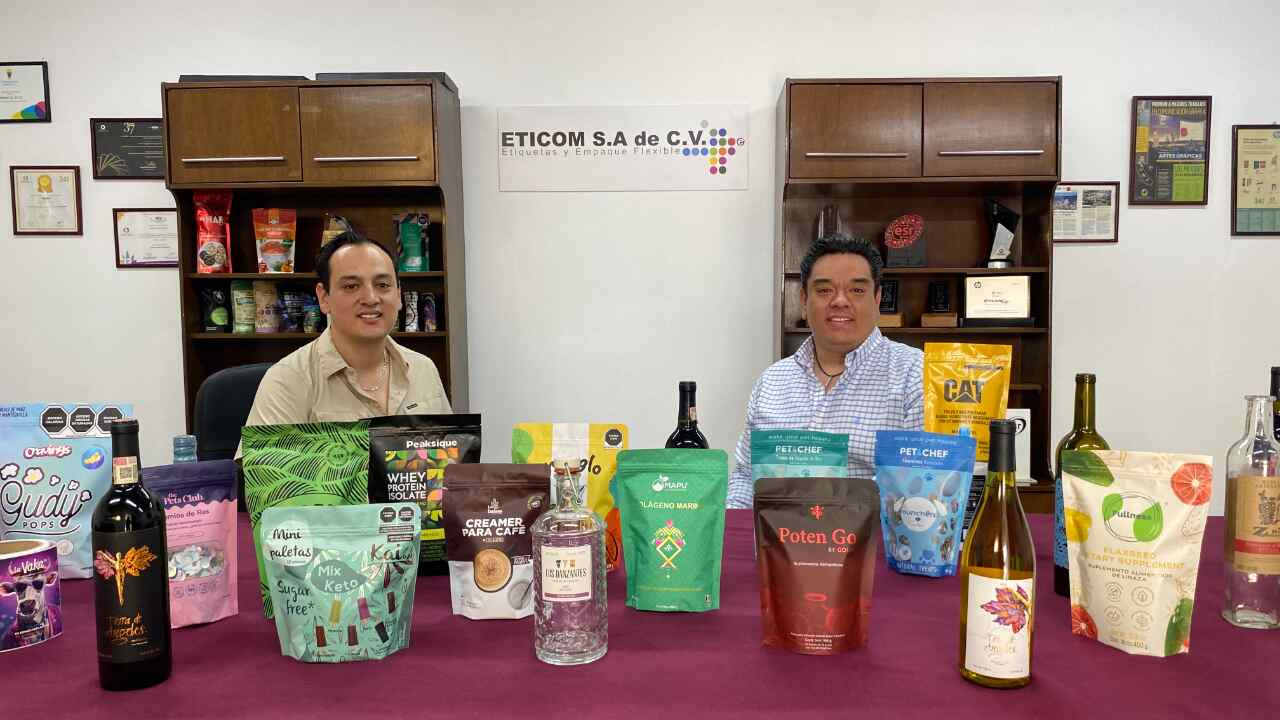Eticom sees success with flex pack expansion
Dive in to know how Mexican label converter Eticom’s move into flexible packaging production five years ago has transformed its business.

Eticom was founded by (L-R) siblings Francisco Ramirez, Jesus Ramirez (current CEO), Hugo Ramirez, Luis Ramirez and Irma Ramirez (not pictured)
Many a label converter has moved into flexible packaging in recent years as a way to diversify their product offering, but few have done so more successfully than Mexico-based Eticom. Five years since making the move, flexible packaging represents 30 percent of its business and will likely reach parity with its label production ‘in the medium term’, the company believes.
Eticom, founded in 2000, moved into flexible packaging production in 2019. ‘We were already running digital presses from HP Indigo for label production, and HP themselves considered us a good candidate to move into flexible packaging. They encouraged us,’ explains Sergio Ramirez, Eticom’s general manager, who oversees the company’s flexible packaging operation. ‘We already understood the digital technology and processes. We had experience printing complicated labels for markets such as wine and artisanal beer.
‘Some of our customers were also beginning to request flexible packaging. They were happy with the service and quality of the labels we were providing them and motivated us to expand our offering. We thought it would be a simple transition to a larger format, but of course, later we realized that there are many more layers to flexible packaging production than we first thought.’
“HP considered us a good candidate to move into flexible packaging. They encouraged us”
Eticom invested in an HP Indigo 20000 digital press and Karlville’s Pack Ready thermal lamination and pouch-making equipment. Stand-up pouches became the main focus, and as well as serving existing customers, Eticom found itself branching into new sectors. ‘Much of the work is for markets we were already serving because a lot of the momentum came from existing customers,’ says Sergio Ramirez. ‘But there are also new markets that have opened because of being able to offer flexible packaging, such as nutraceuticals, with protein powders becoming a key application. This is an example of a market that we couldn’t have reached with labels.
‘Coffee is another sector that previously we barely served, but we now have many coffee producers as customers. This is despite our equipment not being particularly specialized for producing traditional bags for coffee. Some of our new investments will help us to serve this market even better because it’s a big industry in Mexico with a lot of local producers.’
Today, Eticom produces flexible packaging on three printing lines: the initial HP Indigo 20000 has been augmented by subsequent investments in an HP Indigo 25K and a 200K, the digital press manufacturer’s newest machine dedicated to flexible packaging production. The Karlville equipment, meanwhile, will soon be joined by a solventless laminator from Comexi – a deal finalized recently at drupa.
‘It has been an adventure over these past five years,’ says Sergio Ramirez. ‘It has gone well. Flexible packaging already represents around 30 percent of our business. Many customers and many applications have been migrating from labels. We still have a lot of room for growth. In another five years, perhaps it will be the same size as our label business.’
The success of Eticom’s foray into digital flexible packaging production means it is now considering increasing its capacity further with the addition of different processes, says Sergio Ramirez: ‘Because of this trend we have seen with flexible packaging, and what it has represented for our customers and our sales, we might move out of digital-only production and think about wider web flexo. We have made great progress with digital printing, but at some point, we are going to have to complement it with other technologies to be able to handle longer runs.’
The new investment in an SL2 solventless laminator from Comexi is another step towards increasing flexible packaging capacity.
While laminate films are sourced from large global suppliers Nobelus and Taghleef, Eticom’s flexible packaging materials mainly come from local manufacturers who usually sell by the ton to wide web converters printing on flexo, offset or gravure presses. This means that adapting and preparing the materials for printing on the HP Indigo presses has been a challenge, according to Carlos Ramirez, head of digital production and Sergio’s brother. ‘The new Comexi machine will allow us to create our own materials,’ he says. ‘We can print, laminate and make the pouch – we’ll have every aspect of flexible packaging production in our power. It will help to reduce our costs and increase our speed to market.’
Growth
Eticom’s recent growth, in no small part down to its flexible packaging move, led it to relocate to a new 14,000sqm factory two years ago – four times larger than its previous site. It houses both label and flexible packaging production. A second site in Monterrey is dedicated exclusively to label printing, though will likely add equipment for flexible packaging production in the future.
“Flexible packaging already represents around 30 percent of our business”
In Monterrey, label printing takes place on flexo and digital presses and the site accounts for much of the 15-20 percent of overall production that Eticom exports to the United States, where the CBD market is one of the converter’s fastest-growing.
Elsewhere, the company runs seven sales offices scattered across Mexico – in Tampico, Monterrey, Guadalajara, Querétaro, Puebla, Mérida and Durango – as well as two in the US opened four years ago, in Dallas and Houston. It employs around 200 people across all its sites.
Eticom, a family-run business, was founded in 2000 by Jesus Ramirez, the current CEO, and his four siblings, Francisco, Luis, Hugo and Irma. The five sibling founders still run the business today, while Sergio and Carlos Ramirez, general manager and digital production manager respectively, are two of four second-generation family members working at the company.

The company began printing labels on a Mark Andy 830 flexo press before adding further machines from the US press manufacturer as well as Gallus and Aquaflex.
By the time Eticom began to invest in digital presses, it was running 12 flexo machines.
Digital investment for label production began in 2012. The company has used all of HP Indigo’s digital label presses since then, and today runs a fleet of 6k machines. These are complemented by a Xeikon toner press at the site in Monterrey, while a deal was recently struck at drupa for the installation of a Xeikon Panther, Eticom’s first inkjet press.
‘As our first inkjet machine, it will help us to get involved with a new digital printing technology,’ says Carlos Ramirez. ‘We like the visibility and the shine that inkjet can achieve just purely through the inks, without the need for additional finishing. The quality is very good. It is not suitable for all our work, but it’s a complementary technology.’
Eticom also runs Nilpeter FA flexo presses and continues to invest in conventional printing technology, recently ordering a second MO offset press from the Danish manufacturer. Today the company runs more than 25 production lines in total, across digital, flexo and offset, and produces work for a wide range of sectors, including food and beverage, liquors, cosmetics, home and personal care, automotive and pharmaceutical, among others.
‘We continue to invest in all areas of the business,’ says Sergio Ramirez, ‘because fortunately we are seeing growth everywhere.’
Embellishment has been another key area of investment in recent years. Eticom has a long-standing relationship with GM and runs six of the Danish finishing equipment manufacturer’s machines. The company runs further converting equipment from ABG, Brotech and Golden Laser.
Sergio Ramirez credits two GM hot stamping machines for Eticom’s success in gaining an important foothold in the local tequila, craft beer and wine markets: ‘We installed them around seven years ago and they had a huge impact in opening up markets for labels with high-quality embellishments.’ Carlos Ramirez adds: ‘As production manager, I can say that GM is very reliable and is always innovating. We have known each other for many years and they understand our business perfectly.’
Mexican market
Like many converters in Mexico, Eticom has benefited from the ‘nearshoring’ trend which has seen companies in the US, for example, seek to streamline their supply chains after disruption during the pandemic. Mexico has seen an influx of companies setting up in the country, looking to serve the US market with products that need to be labeled before export. Meanwhile, certain end-user sectors such as tequila have been growing strongly. A government mandate for health warnings on packaging further stimulated the local label sector, which then benefited again when the requirement was scrapped. The Mexican peso’s increasingly favorable exchange rate with the US dollar has been a further boon to business.
‘Eticom has seen double-digit growth over the last two years,’ says Sergio Ramirez. ‘I would imagine that it’s not just us, but also many of our competitors who have been experiencing the same market conditions.’

Increasing numbers of these competitors, of course, belong to multinational converting groups, but Ramirez points out that usually, they arrive in Mexico to serve the large global brands they sell to elsewhere.
‘We have talked internally about whether in the future it would be better to be part of a bigger group. However, the companies they are selling to are often multinational brands. We can offer the same quality of technology, and can quickly and efficiently serve those big brands that are left to one side by the bigger groups, but there are also many, many companies in Mexico that don’t fit that profile and who are therefore not served by the bigger groups, and this represents a big opportunity for a company such as Eticom. We’ve invested a lot into the business, but we remain a local company.’
Stay up to date
Subscribe to the free Label News newsletter and receive the latest content every week. We'll never share your email address.


